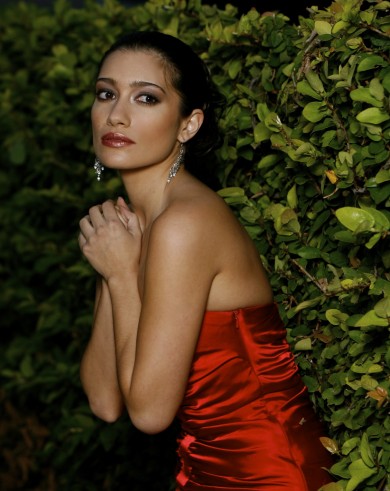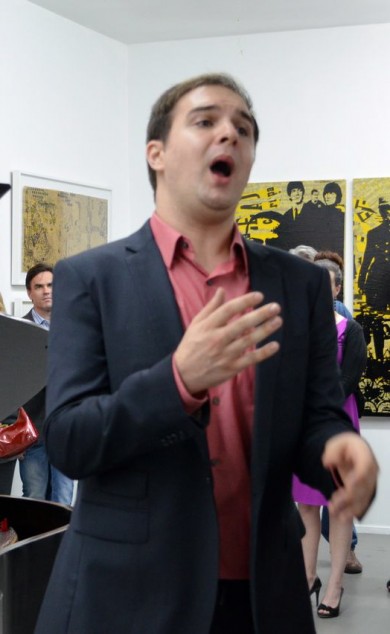Have a drink, see an opera: FGO gets down and dirty with tango double bill in Design District

Catalina Cuervo sings the title role in Piazzolla’s “Maria de Buenos Aires” March 21-24 in the Design District.
The problem with opera, said Susan Danis, general director and CEO of Florida Grand Opera, is that the whole experience can seem rather foreign to people.
“What often happens with opera is you don’t know anything going in, and most people don’t want to pay a nice chunk of money to feel stupid,” she said.
But that’s certainly not the case with two tango operas, which will be performed at a bar in Miami’s Design District March 21 through 24. At The Stage, the company will perform two tango works, Robert Xavier Rodriguez’s Tango and Ástor Piazzolla’s María de Buenos Aires.
The performance situation and plots of the operas have many common denominators with everyday life, Danis said.
“You can have your favorite cocktail, wear your jeans,” she added. “And you might actually find that you think opera is pretty cool.”
The tango double-bill is the first set of performances in Florida Grand Opera’s “Unexpected Opera in Unexpected Places” series, a three-year initiative, partially funded by the Knight Foundation, to bring lesser-known operas to nontraditional venues.
Putting on these performances has brought unique challenges to the opera company, which isn’t used to dealing with things like amplification, unusual staging, or debating whether audiences should stand or sit in a bar. But FGO hopes to be rewarded by bringing new audiences to opera and challenging its current audience to experience opera in a new way.
Rodriguez’s Tango, a comic operetta accompanied by a chamber ensemble that resembles a tango band, tells the story of the tango craze in America and Europe in 1913 and 1914. The opera, premiered in 1985, will be sung in English.
Tango is a one-man show and the sole singer is Matthew Newlin, a tenor member of FGO’s Young Artist Studio. “It’s nerve-wracking because you’re carrying the show, and you’ll go down with the ship if it doesn’t go down well,” he said. “But you also have a lot of creative freedom.”

Matthew Newlin
Newlin plays several different characters, ranging from a cardinal at the Vatican who is denouncing the tango – no physical contact whatsoever, he said – to news reporters from various countries.
Newlin compared performing this opera in an intimate space to doing close-up work on television. The space allows for audience interaction as well. “I know one of the characters, the cardinal, is going to want to look directly into people’s eyes,” he said.
The composer will be present for rehearsals and performances, said Danis. “I’m so excited to have a living, breathing composer able to meet people and talk about his piece and be a part of the audience every night,” she said.
The second opera, María de Buenos Aires, is by Argentine composer Piazzolla will be performed mostly in Spanish. “It has the visceral flavor of tango, but is very sophisticated,” said director José Maria Condemi, of the score. The story, which takes place in Buenos Aires, is rich with magical realism, and follows the tragic story of María, who becomes obsessed with dancing the tango and eventually meets her untimely death. Both this opera and the Rodriguez will include two tango dancers.
Casting singers in the Piazzolla can be tricky, said Condemi. “When the piece is just tango singers, they’re not up to the complexity, and sometimes with opera singers it’s too precious,” he said.
The two leads in FGO’s production, Colombian soprano Catalina Cuervo and Mexican baritone Luis Alejandro Orozco, are the best of both worlds, he said. “These two singers have the ability to really embrace the style,” he said.
The action will take place all around the audience, said Condemi. “It’s not just doing it in an unconventional space, but in an unconventional manner,” he said. “We break down the tradition of separation of performers and audience.”
Because the positioning of the audience doesn’t allow for subtitles or supertitles, the opera will include select lines repeated in English.
FGO’s music director, Ramón Tebar, is looking forward to introducing the audience to the venue. He plans for the musicians to gradually begin playing tango music before the show, and hopes the audience will act like a bar audience – drinking, talking and laughing – instead of sitting at attention, as they would during an opera overture. “Probably our public will be respectful,” he said. “But I hope they are really, really disrespectful, like you’d do in a bar in Argentina.”
The audience will be largely standing. “There will be sofas, some stools, but we want the people to walk if they need to walk, to pay attention if they want, to sleep if they want to,” Tebar said. “But it will be difficult because they will think we are expecting them to behave.”
For some regular opera patrons, the standing-room situation could be a bit of a challenge, said Danis. “A lot of them aren’t sure they can pull a night at the bar and stand around for three hours,” she said. FGO is looking at ways to make seating more available.
In another nod towards the nontraditional presentation, FGO will also be offering what they call “Tweet Tickets,” or free tickets for patrons who agree to post about the show on Twitter or other social media during the performance.
Future events for Unexpected Opera in Unexpected Places series haven’t been set yet, said Danis, and will depend on how this first experiment goes. FGO has looked at spaces from public libraries to “cool rooftop gardens,” to outdoor botanical gardens.
“I love the whole idea of being able to perform what’s considered a stodgy old art form in a place not patronized by your normal opera-going audience, and giving them something they wouldn’t expect,” she said.
But it’s not only the audience that is challenged by operas in unusual spaces, adds Danis. “It’s really had a fascinating outcome of pushing everyone outside of the box, even us.”
Florida Grand Opera presents Robert Xavier Rodriguez’s Tango and Ástor Piazzolla’s María de Buenos Aires March 21-24 at The Stage, 170 NE 38th Street, in Miami. fgo.org; 800- 741-1010.
Corinne Ramey is a journalist and violist based in New York City. She has written for publications including NYTimes.com, Strad Magazine, Strings Magazine, WQXR.org, CityArts, The Forward and the NY Daily News. Originally from Dayton, Ohio, Cory holds degrees in comparative literature, viola performance and journalism from Oberlin College and Conservatory and Columbia University.
Posted in Articles
Leave a Comment
Tue Mar 12, 2013
at 1:35 pm
No Comments
